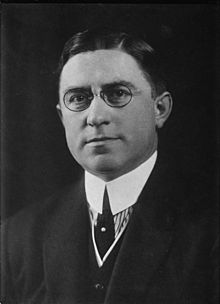Louis Thomas McFadden
| Louis Thomas McFadden | |
|---|---|
 |
|
| Member of the U.S. House of Representatives from Pennsylvania's 14th district |
|
|
In office March 4, 1915 – March 3, 1923 |
|
| Preceded by | William D.B. Ainey |
| Succeeded by | William M. Croll |
| Member of the U.S. House of Representatives from Pennsylvania's 15th district |
|
|
In office March 4, 1923 – January 3, 1935 |
|
| Preceded by | Edgar R. Kiess |
| Succeeded by | Charles E. Dietrich |
| Personal details | |
| Born |
July 25, 1876 Granville Center, Troy Township, Bradford County, Pennsylvania |
| Died | October 1, 1936 (aged 60) New York City |
| Political party | Republican |
Louis Thomas McFadden (July 25, 1876 – October 1, 1936) was a Republican member of the United States House of Representatives from Pennsylvania, serving from 1915 to 1935. A banker by trade, he was an opponent of the Federal Reserve System and was the chief sponsor of the 1927 McFadden Act, which limited federal branch banks to the city in which the main branch operates.
McFadden was born in Granville Center, Troy Township, Bradford County, Pennsylvania. He graduated from Warner's Commercial College (currently known as the Elmira Business Institute) in Elmira, New York. In 1892, he entered the employ of the First National Bank in Canton, Pennsylvania.
In 1899, he was elected cashier; he became its president on January 11, 1916 and served until 1925.
McFadden served as treasurer of the Pennsylvania Bankers' Association in 1906 and 1907, and as president in 1914 and 1915. He was appointed in 1914 by the agricultural societies of the State of Pennsylvania as a trustee of Pennsylvania State College.
In 1914, McFadden was elected as a Republican Representative to the Sixty-fourth Congress and to the nine succeeding Congresses. He served as Chairman of the United States House Committee on Banking and Currency during the Sixty-sixth through Seventy-first Congresses, or 1920-1931. Though re-elected without opposition in 1932, he lost to the Democratic nominee in 1934. He was an unsuccessful candidate for nomination in 1936.
...
Wikipedia
